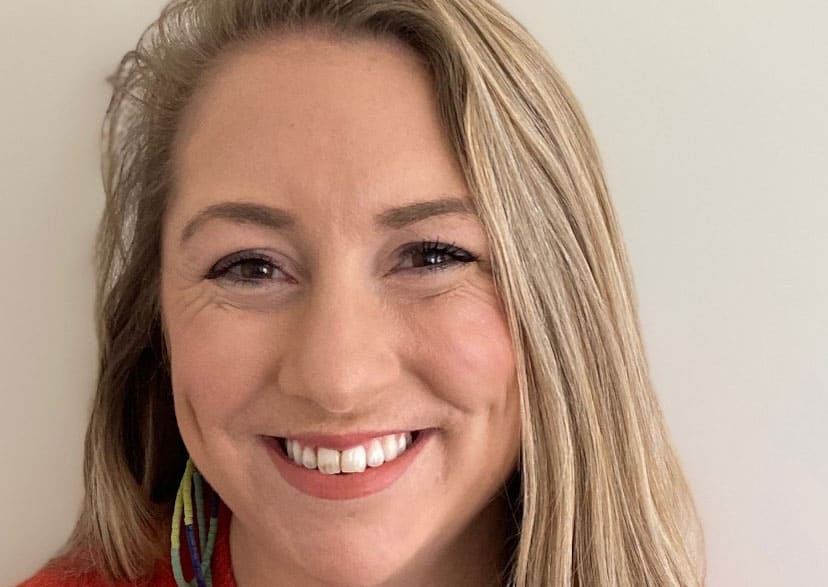Olivia McCall ’13 Infant Mental Health Specialist and Social Worker, PACT Therapeutic Nursery, Kennedy Krieger Institute

Baltimore, MD
Job Title & Employer: Infant Mental Health Specialist and Social Worker, PACT Therapeutic Nursery, Kennedy Krieger Institute
In a few sentences, tell us about yourself.
I am a social worker in Baltimore City, Maryland where I live with my fiancé, Ben. I work as an Infant Mental Health Specialist at PACT Therapeutic Nursery, a program that specializes in serving children under the age of three and their families who are experiencing homelessness or housing uncertainty. When I am not working, I love to cook at home, volunteer, and spend time with friends and family.
Please tell us about your Saint Michael’s experience.
My Saint Michael’s experience was rooted in community, relationship, and impact. I was fortunate to be able to participate in volunteer opportunities with the MOVE office and serve as a member of the Student Association, both incredibly formative experiences. I built meaningful and long-lasting relationships with fellow students, faculty, and staff in these moments — people I still feel close to and think of often, even with distance and time. I learned so much about compassion and the role it plays in making a positive impact in our communities, especially in the context of social justice work.
I think St. Mike’s has an intentional and special way of giving young people opportunities to develop identity and skills by encouraging you to go out and try it on your own, and then supporting you as you come back to reflect on what you learned. For me, that reflection and support came from women I looked up to on campus as mentors — Heidi St. Peter, Allison Cleary, Grace Kelly — and I found this to be a really valuable part of my Saint Michael’s experience.
What advice would you give to women students?
My advice would be to surround yourself with a strong community of women — learn from them, cheer for them, listen and support them, celebrate with them, and teach them what you know. Knowledge is better shared and we have so much to learn from one another — if we are not fully present or don’t take the time to listen to one another, so much of that can get lost.
What are some strategies that can help women achieve a more prominent role in their organizations?
Whatever your role may be, know that you bring value to the work your organization does. Do not downplay your strengths or skills, be PROUD of what you know and what you are capable of — highlight those strengths and skills when you are asking for the raise, promotions, and benefits that you deserve.
What keeps you motivated and driven on a daily basis?
I am motivated by the tender moments that I get to share with the families that I work with — the moments when they feel respected, valued, listened to, and capable. Since my time at Saint Michael’s, I have been working with children and families who are experiencing homelessness. The issue of homelessness in the United States is complex and is the result of many failed systems. I have a responsibility to the families I work with to challenge these failed systems and advocate for sustainable change, but in my role, we don’t see the results of systemic change happen every day. And so, on a daily basis, my most immediate responsibility (and joy!) is to build capacity with our families by helping them strengthen skills they have, work collaboratively with them to address their urgent concerns, and highlight the value that they bring to their family and their community. I am so grateful when our families share these moments with me. It is a privilege and it is what keeps me driven to do it again the next day.
What woman most inspires you and why?
Heidi St. Peter was the Director of the MOVE office while I was a student and she has made a profound impact on me. Still to this day, especially in my work with a population that deserves compassion and respect, I often find myself thinking, “What would Heidi do?” As anyone that knows Heidi can attest, she has an incredibly warm and welcoming spirit that makes you feel important and heard. She is the type of person who leads by example —offering space to process things together, gently challenging you to think critically about an issue or to consider different perspectives. She is also incredibly humble, and in the MOVE office, often reminded students that the service was not about us, it was about the people we were serving. When I think of someone who makes a positive impact on their community, I think of Heidi — I know she is a mentor to so many people, especially women, and she generously shares her knowledge and her time. I credit folks like Heidi for inspiring me to go into social work, and hope that I can return the favor to other women and women-identifying people who are looking for that same type of encouragement and support.
**Originally profiled in 2021**